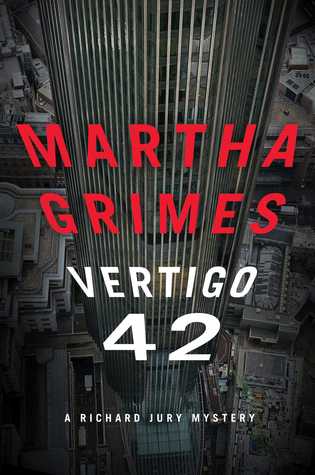 |
| Lucy |
Vertigo 42: A Richard Jury Mystery by Martha Grimes (Scribner, June 2014)
 My verdict on the newest Jury book? I enjoyed it far more than the last installment, The Black Cat: A Richard Jury Mystery, but not quite as much as I did the early books in the series. I'd rate it a 7/10.
My verdict on the newest Jury book? I enjoyed it far more than the last installment, The Black Cat: A Richard Jury Mystery, but not quite as much as I did the early books in the series. I'd rate it a 7/10.At the request of a friend, Richard Jury agrees to look into the suspicious death of a wealthy woman nearly two decades ago. Was it suicide? An accident? Or, as the late woman's husband suspects––murder? Meanwhile, while visiting Melrose in Long Piddleton, Jury is drawn into the investigation of yet another ambiguous death. The two cases have certain similarities, but are they connected?
I've been following this series for close to (gulp!) 30 years. I've not been thrilled with the last several entries, and I suspect my buying and reading of these books in recent years owes more to sentimentality than it does to any genuine interest in the mysteries themselves. That being said, I was satisfied with this Jury outing.
 |
| The real Vertigo 42 bar |
The mystery was completely implausible; mostly homage to Hitchcock's Vertigo, but it was entertaining nonetheless. If you're an armchair sleuth, this one should hold your interest right up until the last chapter, with a red herring or two (or three) tossed in to keep you guessing. If you read these books (as I do) for the fine characterization, then you shouldn't be disappointed. Jury, Melrose and Wiggins are gifted with snippets of sharp, clever dialog. (Well-written dialog is such a joy to read; I wish more authors were as skilled in that department as Ms. Grimes is.)
What's missing in this one? No chapters told from a dog or cat's point of view (thank you!), only a brief appearance by the annoying Harry Johnson and no preternaturally adult-like children (or at least they don't dominate the story). No complaints from me in that department! Very little (if any) strong language and no sexual content.
 |
| Martha Grimes |
The first book in the series is The Man with a Load of Mischief. Do yourself a favor and start there. (You can thank me later.)
"She had refused to marry him years before, but it was somehow hard for him to let go, if not of the feeling itself, then of the memory of the feeling. He wondered how much of love was actually nostalgia." (Vertigo 42, p. 136)
Interesting question, isn't it: How much of love is actually nostalgia?
